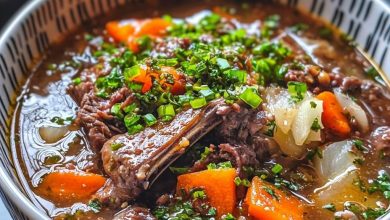
Modern-Day Taboos: Groceries and Foods That Have Been Forbidden
In the ever-evolving world of nutrition and health, there are certain groceries and foods that have become the subject of controversy and have been deemed as modern-day taboos. These items, once considered pantry staples, are now discouraged or completely forbidden by various dietary approaches and health enthusiasts.
In this article, we will explore some of these controversial foods and the reasons behind their exclusion.
1. Gluten-Containing Grains
Gluten-containing grains like wheat, barley, and rye have been targeted by those following a gluten-free lifestyle. Gluten is a protein found in these grains that can cause digestive issues and other health problems for individuals with gluten sensitivity or celiac disease. As a result, gluten-free diets have gained popularity, and products made with alternative flours like almond, coconut, or rice flour have become preferred choices for those seeking to avoid gluten.
2. Dairy Products
Dairy products, including milk, cheese, and yogurt, have faced criticism due to concerns over lactose intolerance, allergies, and the potential health risks associated with their consumption. Some argue that dairy can contribute to digestive issues, inflammation, and hormonal imbalances. As a result, plant-based alternatives like almond milk, soy milk, and coconut yogurt have become popular choices for individuals avoiding dairy.
3. Processed and Refined Sugar
Processed and refined sugar, often found in sugary snacks, desserts, and sweetened beverages, has been widely condemned for its negative impact on health. Excessive sugar consumption has been linked to weight gain, increased risk of chronic diseases, and dental problems. As a result, many individuals and health-conscious consumers opt for natural sweeteners like honey, maple syrup, or stevia as alternatives.
4. Artificial Sweeteners
Artificial sweeteners, such as aspartame, saccharin, and sucralose, have faced scrutiny due to concerns about their potential health effects. While these sweeteners provide zero or low-calorie alternatives to sugar, studies have raised questions about their impact on metabolism, gut health, and the potential to disrupt natural hunger and satiety cues. As a result, some individuals choose to avoid artificial sweeteners altogether.
5. Trans Fats
Trans fats, often found in processed and fried foods, have been widely condemned due to their harmful effects on heart health. These fats are known to increase LDL cholesterol levels and contribute to cardiovascular disease. In response to these concerns, many countries have implemented bans or restrictions on the use of trans fats in food manufacturing, leading to a decrease in their presence in many products.
6. Genetically Modified Organisms (GMOs)
Genetically modified organisms (GMOs) have sparked debates over their safety and potential long-term effects on human health and the environment. Some individuals choose to avoid GMOs by opting for organic foods or products labeled as GMO-free. The goal is to support more sustainable farming practices and ensure the absence of genetically modified ingredients in their diet.
7. Artificial Food Additives and Preservatives
Artificial food additives and preservatives, such as artificial colors, flavors, and preservatives like BHA and BHT, have faced criticism for their potential negative impact on health. Some studies have suggested a link between these additives and allergic reactions, hyperactivity in children, and other health concerns. As a result, many individuals choose to prioritize whole foods and products with minimal artificial additives.
It’s important to note that the exclusion of these foods and groceries is a personal choice and can vary depending on individual dietary preferences, health conditions, and beliefs. It’s always advisable to consult with a healthcare professional or registered dietitian before making significant changes to your diet.
What Not to Buy: Forbidden Groceries and Foods in the Modern Era
As our understanding of nutrition and health continues to evolve, there are certain groceries and foods that have become taboo in the modern era. These items are often discouraged or outright forbidden due to concerns about their impact on health, sustainability, or ethical considerations. In this article, we will explore some of the forbidden groceries and foods that you may want to think twice about before adding to your shopping cart.
1. Shark Fin
Shark fin soup has long been considered a delicacy in certain cultures. However, the demand for shark fin has led to devastating consequences for shark populations and marine ecosystems. Due to unsustainable fishing practices and the cruelty involved in finning, many countries and organizations have banned the sale and consumption of shark fin products. It’s important to opt for sustainable seafood choices and support efforts to protect vulnerable marine species.
2. Foie Gras
Foie gras is a controversial food made from the fattened liver of ducks or geese. The production of foie gras involves force-feeding the animals to enlarge their livers. This practice has raised ethical concerns and led to the ban of foie gras in several countries and regions. Consider alternatives that prioritize animal welfare and opt for cruelty-free options when it comes to your food choices.
3. Orangutan-Unfriendly Palm Oil
Palm oil is a commonly used ingredient in many processed foods, cosmetics, and household products. However, the production of palm oil has been linked to deforestation, habitat destruction, and the endangerment of orangutans and other wildlife. To support sustainable palm oil production, look for products that use certified sustainable palm oil or opt for alternatives that use different types of oil altogether.
4. Battery-Caged Eggs
Battery-caged eggs come from hens that are confined to small wire cages, often leading to poor welfare conditions. Many consumers have chosen to avoid these eggs and opt for cage-free, free-range, or organic eggs from hens raised in more humane environments. By supporting ethical egg production, you can contribute to improved animal welfare standards in the agricultural industry.
5. Unsustainable Seafood
The depletion of fish populations and the impact of overfishing on marine ecosystems have led to the need for sustainable seafood choices. Certain species, such as bluefin tuna and Chilean sea bass, are heavily overfished and face the risk of extinction. When purchasing seafood, refer to sustainable seafood guides or look for certifications like the Marine Stewardship Council (MSC) label to ensure that you are making responsible choices.
6. Certain Animal-Derived Products
The ethical concerns surrounding certain animal-derived products have led many individuals to avoid them. Items such as fur, ivory, and certain exotic animal products are often associated with unethical practices, illegal trade, and cruelty to animals. Choosing alternatives made from synthetic materials or supporting sustainable and cruelty-free fashion can help promote ethical standards and protect wildlife.
7. Single-Use Plastics
While not a grocery or food item per se, single-use plastics have become a major concern in our modern era. Items like plastic bags, straws, and disposable packaging contribute to pollution, harm wildlife, and have a detrimental impact on the environment. Opt for reusable alternatives, such as cloth bags, stainless steel straws, and eco-friendly packaging options, to reduce your reliance on single-use plastics.
By being mindful of the forbidden groceries and foods mentioned above, you can make informed choices that align with your values, promote sustainability, and contribute to a healthier and more ethical food system.
The world of nutrition is constantly evolving, and certain groceries and foods have become modern-day taboos due to various reasons ranging from potential health concerns to dietary restrictions. Whether it’s avoiding gluten-containing grains, dairy products, processed sugar, artificial sweeteners, trans fats, GMOs, or artificial additives and preservatives, individuals make these exclusions based on personal beliefs and health goals. As with any dietary changes, it’s essential to make informed decisions and prioritize a well-rounded and balanced diet that suits your specific needs.





